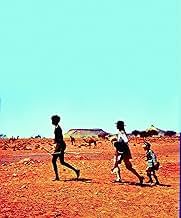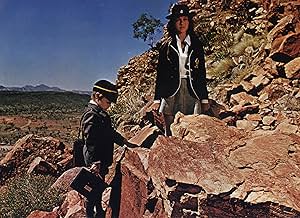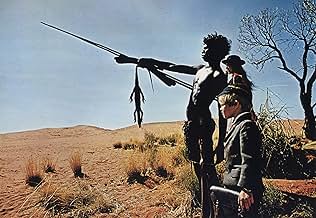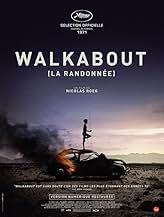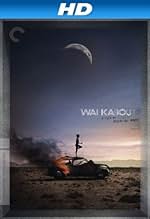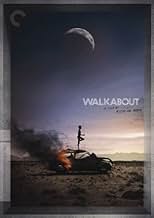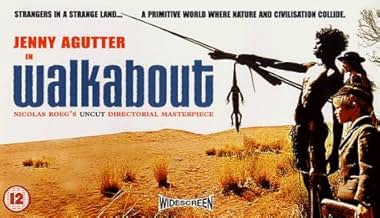Two city-bred siblings are stranded in the Australian Outback, where they learn to survive with the aid of an Aboriginal boy on his "walkabout": a ritual separation from his tribe.Two city-bred siblings are stranded in the Australian Outback, where they learn to survive with the aid of an Aboriginal boy on his "walkabout": a ritual separation from his tribe.Two city-bred siblings are stranded in the Australian Outback, where they learn to survive with the aid of an Aboriginal boy on his "walkabout": a ritual separation from his tribe.
- Director
- Writers
- Stars
- Awards
- 1 win & 1 nomination total
- Black Boy
- (as David Gumpilil)
- Man
- (as Robert McDara)
- No Hoper
- (as Pete Carver)
- German Scientist
- (as Noelene Brown)
- Radio Announcer
- (voice)
- (uncredited)
- Director
- Writers
- All cast & crew
- Production, box office & more at IMDbPro
Featured reviews
The film is about nature, and man's relationship with it. If a civilised person were left out in the desert, then they would soon die. But, as this film shows, there are people and creatures living out there quite happily.
The film has been criticised for having a weak beginning and a weak end. But where does the story of this film start? And where and when would you end it? Yes you can end it when the two children get back to civilisation. But does the story end there? No. Because of their experiences, things are never going to be the same again. And for them, the story has not finished, it is only just beginning.
I have seen this film several times and I notice something different every time I see it.
On a less superficial level it is a film with a point-something along the lines of the graciousness of Aborigines and their ability to live in harsh surrounds, and the destructive nature of suburban life in a flat in a major city.
I think it would be a film, like Jedda, that will always be on reference for the Australian Outback, Aboriginals and the modern society which brought a European civilisation to their land.
*** 1/2 (out of 4)
A girl (Jenny Agutter) and her young brother (Luc Roeg) find themselves in the Australian outback trying to survive after being left out there. Soon they run across a hunter (David Gulpilil) who is out there on a "walkabout."
Nicolas Roeg's WALKABOUT is without question one of the greatest looking films that you're ever going to see. I've often said that this film did for the outback what Stanley Kubrick's 2001: A SPACE ODDYSEY did for space. I mean, whenever you think of a dessert setting your mind can't help but go to the images on display throughout this poetic look at struggle.
For my money the greatest thing done by Roeg is just the atmosphere and setting that he creates. There's not too much dialogue but what really moves the film is the beautiful music score and cinematography. The images that we view are breathtaking from the opening scenes to the closing ones. The stuff in the outback is beautifully captured and there's no doubt that the setting comes to life. The music score also perfectly captures the innocence and beauty of everything going on.
The performance by the three leads are another major plus. Agutter rightfully became a name after this picture and it's easy to see why. The role here certainly isn't flashy but the actress is able to do so much with such little dialogue. Her eyes certainly tell you everything you need to know and there's a very intelligent performance. You can see her intelligence without her saying a word. Both Roeg and Gulpili are equally as great in their supporting roles.
WALKABOUT is certainly a very poetic film that has some of the greatest images that you're ever going to see. It's really a film full of life and the way it plays out holds your attention from start to finish.
Did you know
- TriviaLuc Roeg was actually sun-burnt in the scene where the aboriginal boy treats his back by rubbing him with fat from a wild boar. Director Nicolas Roeg thought it would make a good scene for the film so he picked up the camera and shot it.
- GoofsThe credits name the actor playing "Black Boy" as David Gumpilil. It should be David Gulpilil.
- Quotes
Narrator: [last lines - from "Poem XL" by A.E. Housman's "A Shropshire Lad"] Into my heart an air that kills, From yon far country blows: What are those blue remembered hills, What spires, what farms are those? That is the land of lost content, I see it shining plain, The happy highways where I went, And cannot come again.
- Crazy creditsAfter the credits, there is a flash of white light on the screen and as it becomes a black screen, radio tuning is heard while the words "rien ne va plus" are shown.
- Alternate versionsA director's cut of this movie was released in 1997 with 5 additional minutes. This cut is identical to the original British release version (100 minutes): the film was shortened by five minutes for its original American release.
- ConnectionsEdited into Terror Nullius (2018)
- SoundtracksElectronic Dance
Written and performed by Billy Mitchell
Details
- Release date
- Countries of origin
- Languages
- Also known as
- Encuentro de dos mundos
- Filming locations
- Production companies
- See more company credits at IMDbPro
Box office
- Budget
- A$1,000,000 (estimated)
- Gross worldwide
- $1,888


